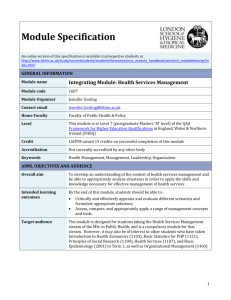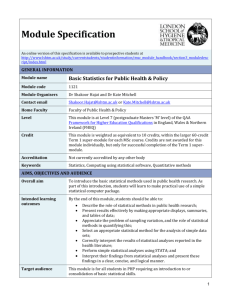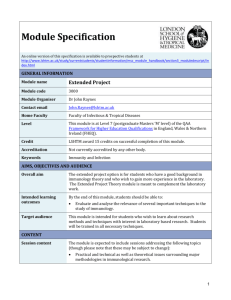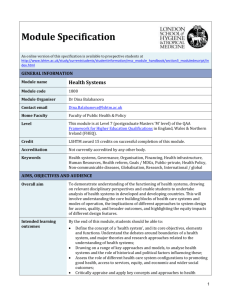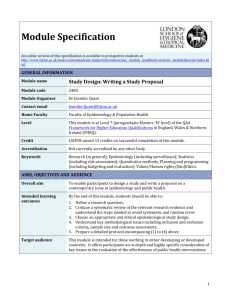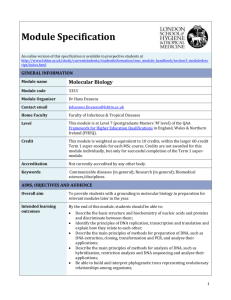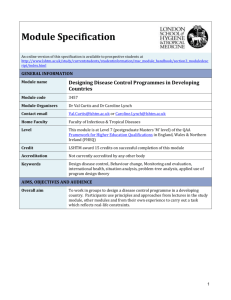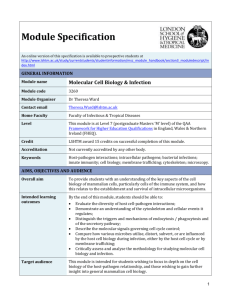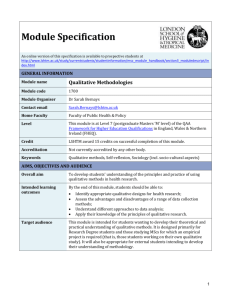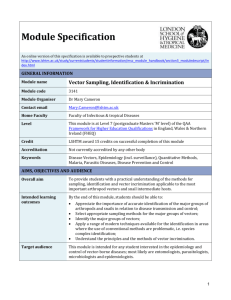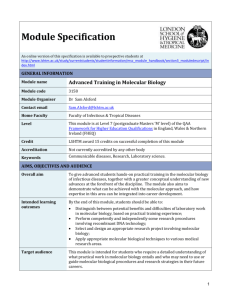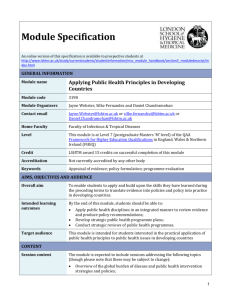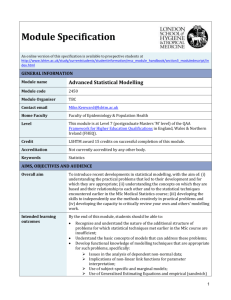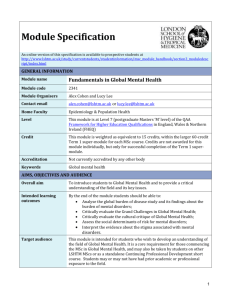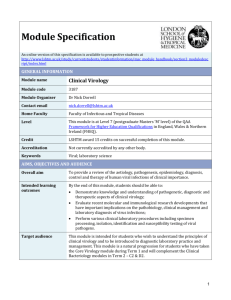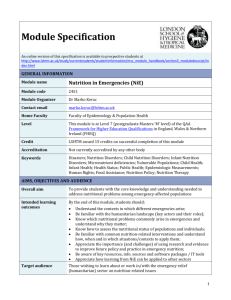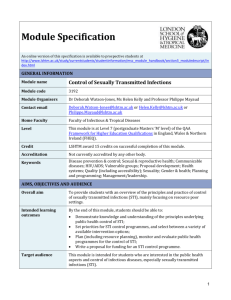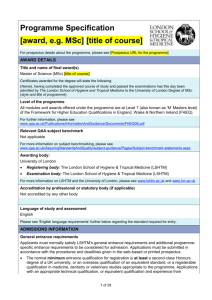1401 History & Health Module Specification
advertisement
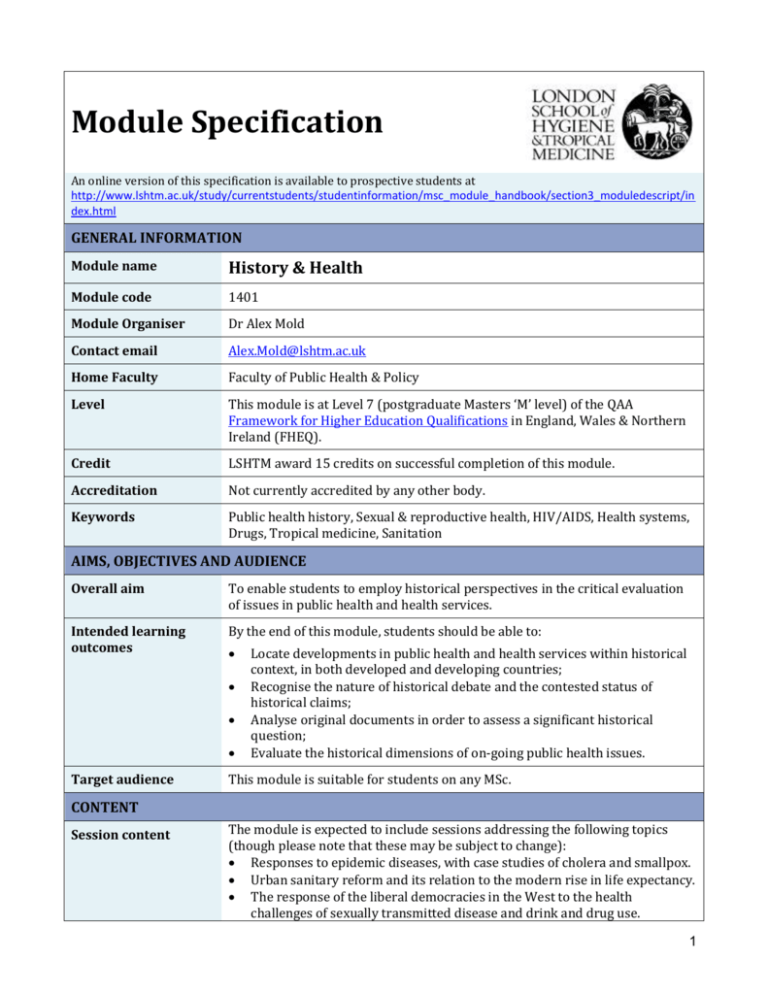
Module Specification An online version of this specification is available to prospective students at http://www.lshtm.ac.uk/study/currentstudents/studentinformation/msc_module_handbook/section3_moduledescript/in dex.html GENERAL INFORMATION Module name History & Health Module code 1401 Module Organiser Dr Alex Mold Contact email Alex.Mold@lshtm.ac.uk Home Faculty Faculty of Public Health & Policy Level This module is at Level 7 (postgraduate Masters ‘M’ level) of the QAA Framework for Higher Education Qualifications in England, Wales & Northern Ireland (FHEQ). Credit LSHTM award 15 credits on successful completion of this module. Accreditation Not currently accredited by any other body. Keywords Public health history, Sexual & reproductive health, HIV/AIDS, Health systems, Drugs, Tropical medicine, Sanitation AIMS, OBJECTIVES AND AUDIENCE Overall aim To enable students to employ historical perspectives in the critical evaluation of issues in public health and health services. Intended learning outcomes By the end of this module, students should be able to: Target audience Locate developments in public health and health services within historical context, in both developed and developing countries; Recognise the nature of historical debate and the contested status of historical claims; Analyse original documents in order to assess a significant historical question; Evaluate the historical dimensions of on-going public health issues. This module is suitable for students on any MSc. CONTENT Session content The module is expected to include sessions addressing the following topics (though please note that these may be subject to change): Responses to epidemic diseases, with case studies of cholera and smallpox. Urban sanitary reform and its relation to the modern rise in life expectancy. The response of the liberal democracies in the West to the health challenges of sexually transmitted disease and drink and drug use. 1 The development of the medical profession, and the coming of 20th century welfare states in which health services became central political matters. Public health in the twentieth century and the international rise of health promotion. Our focus is largely on Britain, the US, Germany, and also on public health and health systems in developing countries. TEACHING, LEARNING AND ASSESSMENT Study resources provided or required Source material for essays available on Moodle or through the Library. Teaching and learning methods Lectures provide an introduction to themes and debates in the history of public health, to the work of well-known historians, and to methods of historical research. Seminars follow a workshop format, in which we critically assess original sources on public health, including documents, film, cartoons and posters; preparatory reading for these seminars is essential. There will be a visit to the LSHTM Archive and Library to examine historical evidence and sources. Guidance will be provided on the choice of historical research assignment from a list of topics, and advice given on relevant documentary and secondary sources. Assessment details Assessment is by an individual historical research assignment. This takes the form of a 3,000 word essay. Students may choose from a list of essay titles or devise their own topic. For students who are required to re-sit, or granted a deferral or new attempt, the task will be a 3,000 word essay. Assessment dates Assessments will be due on Friday 12 February 2016. For students who are required to re-sit, or granted a deferral or new attempt, the next assessment deadline will be the standard School recommended date in mid/late September 2016. Language of study and assessment English (please see ‘English language requirements’ below regarding the standard required for entry). TIMING AND MODE OF STUDY Duration The module runs for 5 weeks at 2.5 days per week; this module runs between Wednesday afternoon and Friday afternoon. Dates For 2015-16, the module will start on Thursday 14 January 2016 and finish on Friday 12 February 2016. Timetable slot The module runs in LSHTM timetable slot C2. Mode of Study The module is taught face-to-face in London. Both full-time and part-time students follow the same schedule. For full-time students, other LSHTM modules are available in the other half of the week for the C and D slots. Learning time The notional learning time for the module totals 150 hours, consisting of: Contact time ≈ 30 hours Directed self-study ≈ 36 hours Self-directed learning ≈ 14 hours Assessment, review and revision ≈ 70 hours 2 APPLICATION, ADMISSION AND FEES Pre-requisites No prior knowledge of historical methods is assumed, although attendance on Principles of Social Research (1104) in Term 1 will be advantageous. English language requirements A strong command of the English language is necessary to benefit from studying the module. Applicants whose first language is not English or whose prior university studies have not been conducted wholly in English must fulfil LSHTM’s English language requirements, with an acceptable score in an approved test taken in the two years prior to entry. Applicants may be asked to take a test even if the standard conditions have been met. Student numbers Student numbers are typically 20 per year; numbers may be capped due to limitations in facilities or staffing. Student selection Preference will be given to LSHTM MSc students, particularly those registered for specific courses or who have taken specific prior modules, where applicable, and LSHTM research degree students. Other applicants meeting the entry criteria will usually be offered a place in the order applications are received, until any cap on numbers is reached. Applicants may be placed on a waiting list and given priority the next time the module is run. Full Registration (full participation) by LSHTM research degree students is required for this module, although the assessment for research degrees students is optional. Fees For registered LSHTM MSc students, fees for the module are included within MSc fees (given on individual course prospectus pages). If registering specifically for this module, as a stand-alone short course, individual module fees will apply. Tuition fees must be paid in full before commencing the module, or by any fee deadline set by the Registry. Scholarships Scholarships are not available for individual modules. Some potential sources of funding are detailed on the LSHTM website. Admission deadlines For 2015-16: For registered LSHTM MSc students, the module choice deadline (for Term 2 and 3 modules) is Friday 20 November 2015. If registering specifically for this module, applications may be made at any time but, as places are limited, early application is recommended. All applications should be submitted by, at the latest, 8 weeks prior to the start of the module. Formal registration will take place on the morning of the first day of the module. ABOUT THIS DOCUMENT This module specification applies for the academic year 2015-16 Last revised 20 July 2015 by Alex Mold London School of Hygiene & Tropical Medicine, Keppel St., London WC1E 7HT. www.lshtm.ac.uk 3
